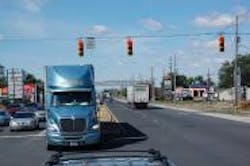"This study clearly shows that the long-term perspective, value-based decision making and independence from the capital market give family-owned businesses a genuine competitive edge in the marketplace.” –Karena Strella, co-leader for Egon Zehnder International's U.S. operations
You’d be forgiven for thinking the heyday for family-owned trucking businesses is long since passed in this country.
I mean, just looking at the vicious toll the Great Recession took on trucking. According to Donald Broughton, managing director for Avondale Partners, in the first two quarters of 2008 alone, some 88,000 trucks left the market due to business failures – some 4.5% of the industry’s capacity.
And the pace of bloodletting didn’t let up for years, with 730 trucking companies filing for bankruptcy in the first quarter of 2010m taking 33,360 tractor-trailers off the highways. Not until the first quarter of this year did the death spiral slow down, with “only” 295 trucking companies filing for bankruptcy taking 5,420 commercial vehicles trucks out of the market, Broughton's data indicated.
Make no mistake here: a lot of those unfortunate failures were small, family-owned entities, which form the backbone of this industry. Just look at these statistics for 2010 compiled by the American Transportation Research Institute (ATRI): in 2010, 96% of all the trucking companies in business operated 20 trucks or fewer, with 88% operating six trucks or fewer.
Those figures indicate to me at least that the “family-owned” trucking company still remains a viable model, despite the higher price for equipment, flat-lining freight volumes, and fuel prices that remain high by historical standards.
It’s also helpful to note that, according to Chicago-based venture capital fund Gaebler Ventures, despite the rising influence of big corporations, family owned operations continue to be a powerful economic force in the U.S. In fact, many of big U.S. corporations themselves are family-owned companies.
Indeed, family businesses account for a staggering 50% of U.S. gross domestic product (GDP), according to Gaebler’s numbers. And while it's tempting to believe that the majority of family business GDP is attributable to thousands of small operations, it’s important to recognize that 35% of Fortune 500 companies are in actuality family-owned companies.
That means family-based operations are represented across the full spectrum of American companies, from small businesses to large corporations, the firm noted.
On top of all of this, being “family-owned” is a characteristic with deep roots in the trucking space, with some of the biggest and most well-known companies all staring out this way, from J.B. Hunt Transportation Services (founded by the late Johnnie Bryan Hunt) and Knight Transportation (where Kevin Knight serves as chairman and CEO) to Werner Enterprises (where Clarence Werner became Chairman Emeritus this year of the company he founded in 1956). And though those behemoths are now publicly-owned titans, the family connection remains strong in all of them.
There’s also some new research indicating that being a “family-owned” firm offers some distinct advantages, too, and not just in trucking. Indeed, according to a study just released by executive search firm Egon Zehnder International, more than half of all family-owned business owners and executives worldwide overwhelmingly attribute the nature of their businesses to helping them cope and prosper through the economic downturns.
The firm surveyed 720 family business owners and executives from a variety of companies spread out across the Americas, Asia-Pacific and Europe. Here are some of the findings:
• 56.3% of respondents stated that the most striking advantage of family-owned businesses is their long-term perspective. In the U.S., 47.2% of respondents agreed with this. This was the highest in Sweden (83.3%) and the lowest in India (25.7%).
• Two out of three family business owners state that the nature of family businesses helps them cope with economic downturns. (76.5% in Great Britain; 52% in India; 48.1% in the U.S.).
• For the majority of survey respondents (53% of executives, 64% of family business owners) their longer-term outlook means that family businesses can afford to be more innovative than other companies.
Yet it’s not just about “innovation” here – it’s also about the passion and pride family-owned firms maintain for the fields they work in, and nowhere is that more true in trucking.
Take Shawn Cielke, for example, president of Sweet Rides Logistics. An owner-operator based out of Haugan, MT, Ceilke and his family spent three years of hard earned money and personal time transforming his 2006 Kenworth W-900B (seen at right) into a one-of-a-kind rig.
Yet it’s not just about crafting a sharp piece of iron to take to show truck competitions. Rather, Cielke believes it’s a one-of-a-kind calling card that tells customers something about his business philosophy, especially in terms of the type of service they’ll be getting.
“I’d say my truck affects about 80% of the freight I haul,” he told me from the road. “The customer knows a truck like this won’t break down often at all, because by the way it looks, they know I take great care of. They also know a truck like mine delivering their products impresses their customers. Dock workers and yard guards take pictures of this truck; so do DOT [Department of Transportation] inspections. Thus my customers get noticed in ways they’ve never been noticed before.”
Cielke hauls a smattering of everything, which recently included load of watermelons. But it’s what happens when a customer sees his truck that makes the difference, he explained, pointing to that “watermelon load” as a prime example.
“We got that load through a broker,” Cielke noted. “But when I made my delivery, the customer came running up to my truck while we were unloading – camera in hand to take photos – and wanted us to start hauling his produce direct for him. All of a sudden, I now have a chance to sign up another regular customer.”
Proof positive that family-owned trucking firms can still snag significant success in this rough-and-tumble industry.
